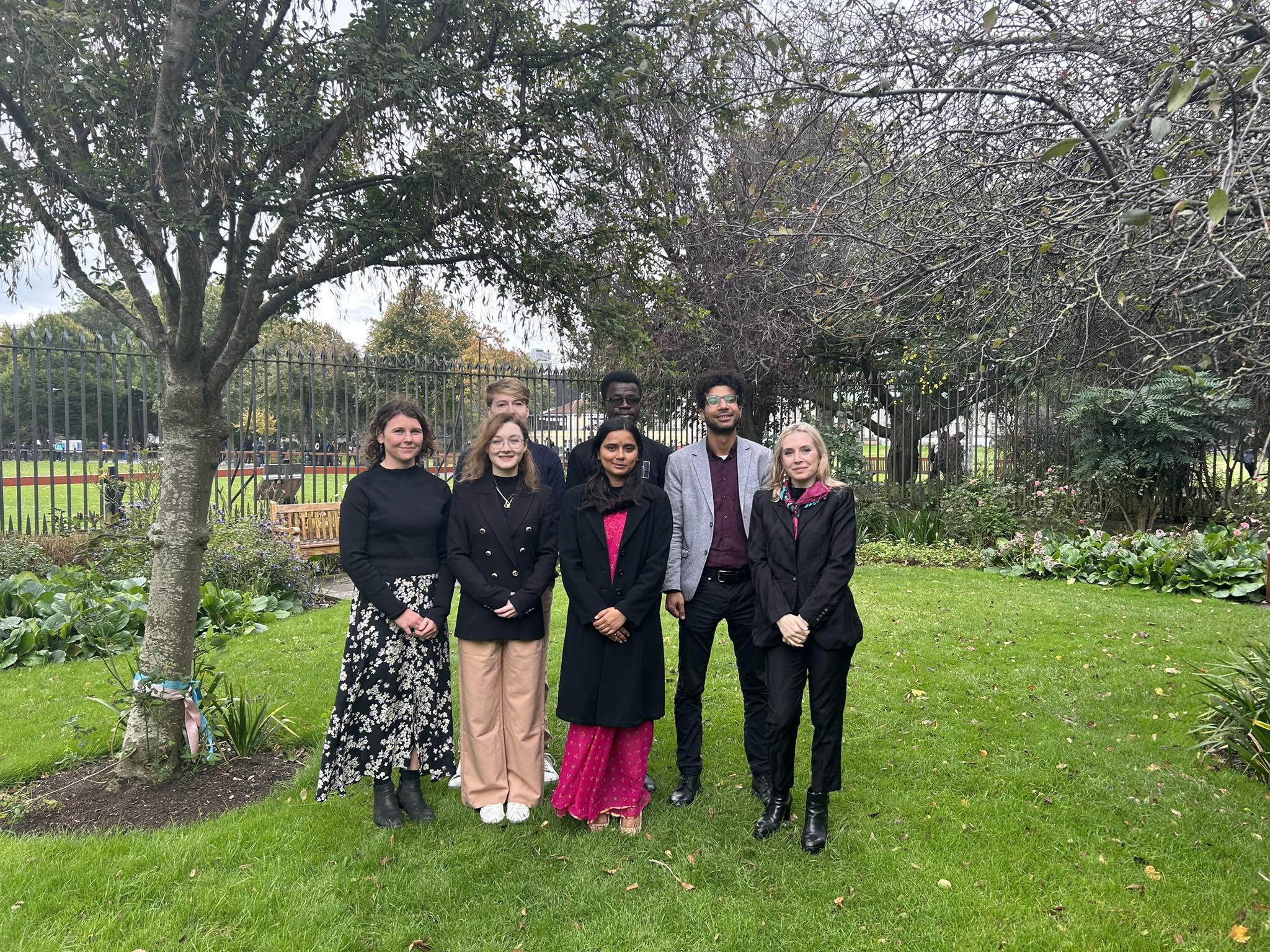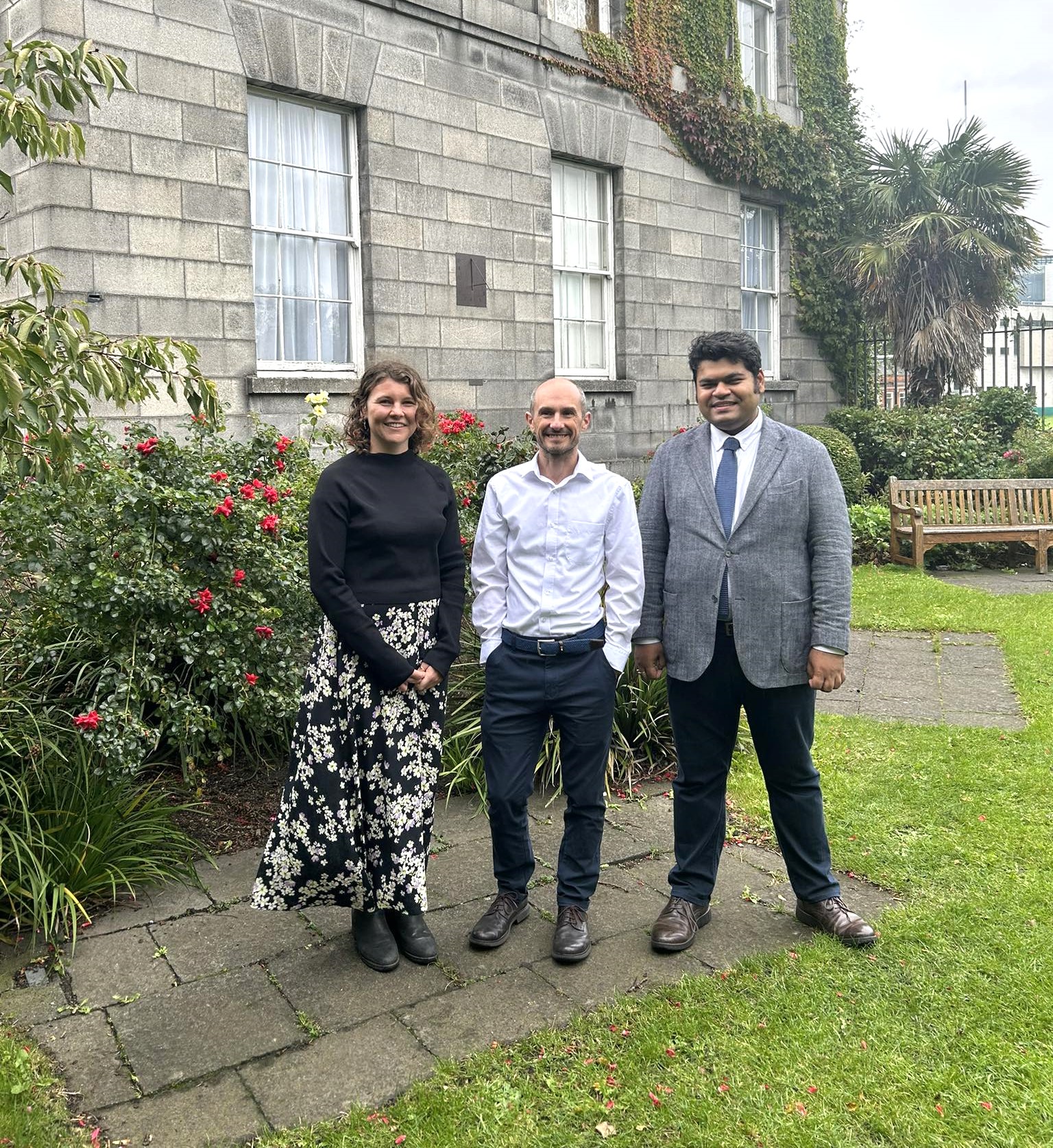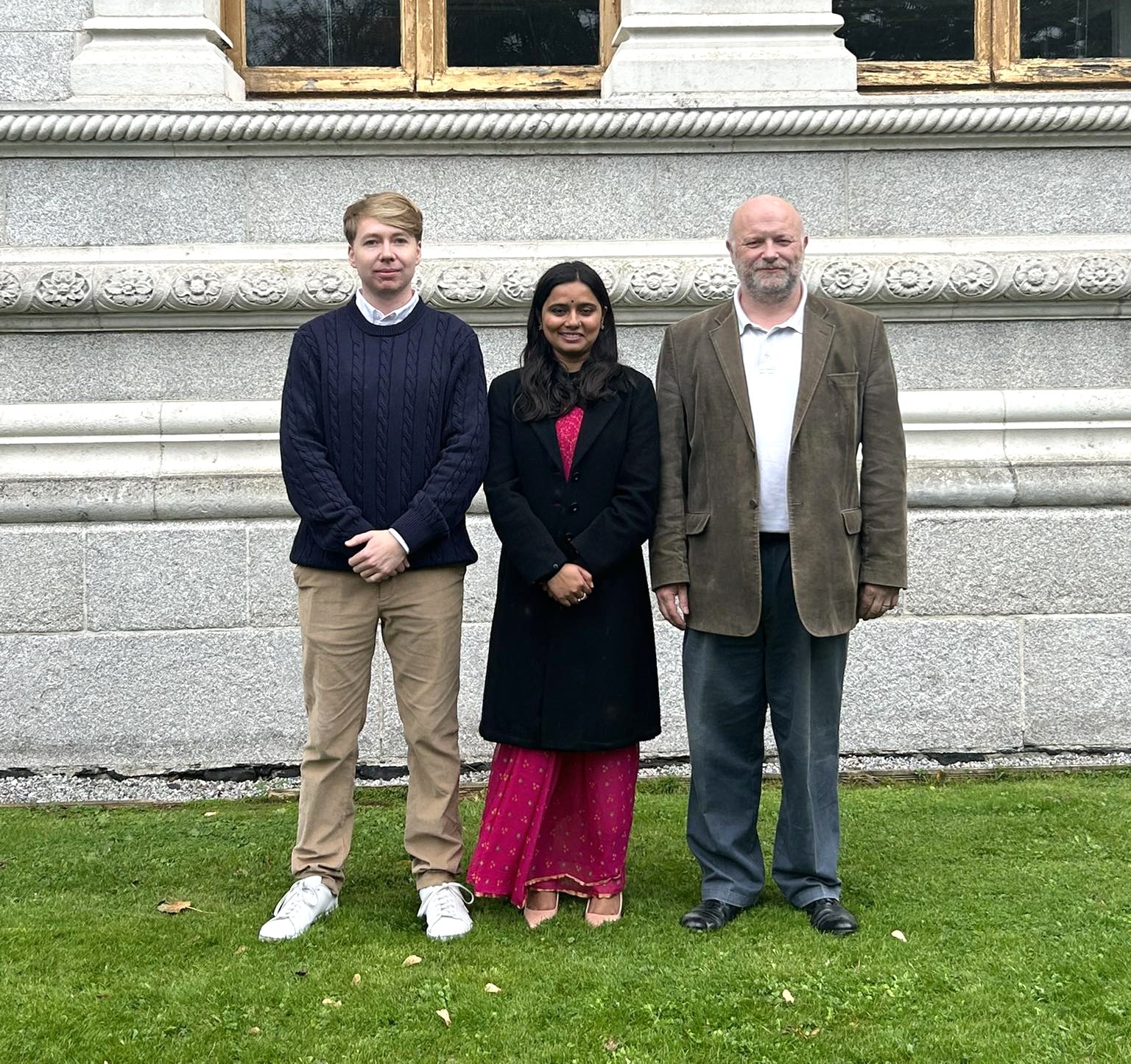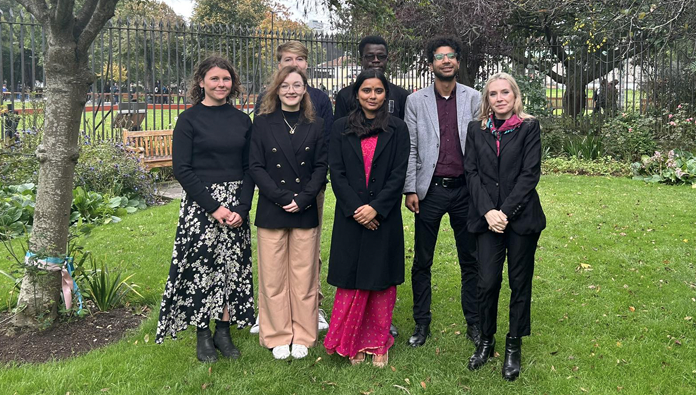School of Law Celebrates PhD Student Funding Awards 2023/24
2023 has been an extraordinarily successful year for the Trinity Law School Postgraduate research student community in terms of research funding awards. As well as the individual PhD awardees, as recorded below, there will be incoming PhD researchers in the coming year, funded under the Trinity Research Doctorate Awards - Group-based research projects, under the supervision of Professors Rachael Walsh and Sarah Hamill (with academics from other Trinity schools) for their project ‘Achieving Sustainable Housing Affordably’ and under the supervision of Professor Des Ryan (again, with academics from other Trinity schools) for the project, ‘Sports-related Concussions and Legal Implications for the 21st Century’.

Pictured L-R: Emily Cunniffe, Deirbhile Kearney, Kaberi Basu, Morgiane Noel, Nixon Logue, Naphtali Ukamwa, Ahmed Ellaboudy (other awardees not pictured: Sam Boss, Arushi Sharma, Jonathon Boylan)
- Kaberi Basu’s PhD “Data Nationalism and its impacts on Civil Liberties: Focus on Indian Data Policies” has earned her a position of project manager for SCOIR, a project on Secondary rights, Copyright, Open Access, Institutional Policies and Rights retention. SCOIR is funded, under the supervision of Dr Eoin O’Dell, by the National Open Research Forum (NORF) to find legislative and policy solutions to make open accessibility for researchers, institutions and downstream knowledge wrinkle free. One of the major threads in Kaberi’s PhD thesis is the analysis of civil liberties and the emphasis on access; To information, education and the internet. Additionally, valuation and regulation of information is at the heart of both the projects.
- Sam Boss was awarded the ‘Government of Ireland Scholarship’ by the Irish Research Council in respect of his thesis. Sam argues that the right to freedom of thought is a fundamental right, yet this is belied by its current use as a mere rhetorical device. His research interrogates this right in relation to emerging technologies, in particular artificial intelligence systems and neurotechnology. It explores the ways in which thoughts, opinions and beliefs can be subtly manipulated through the application of such technology in various contexts, and how the right to freedom of thought can act as a bulwark to defend the individual against this increased buffeting of the mind.
- Jonathon Boylan was awarded the John A. Boland memorial prize by the UK Trust for Trinity College Dublin. Jonathon's PhD research aims to elucidate how law can and should be used to ensure ethical usage of artificial intelligence. It does so by highlighting the ethical challenges posed by the substitution of human interaction with artificial agents, in juxtaposition with an analysis of whether existing legal doctrine is capable of coherently responding to those challenges.
- Jizhou Chen was awarded the CSC-Trinity College Dublin Joint Scholarship for his research on “Examining the Implementation of the Double Materiality Principle in Corporate Sustainability Reporting in Ireland” under the supervision of Professor Felix Mezzanotte. The Corporate Sustainability Reporting Directive (CSRD) was enacted on 5 January 2023, imposing mandatory sustainability disclosure obligations on European companies. Double materiality under the CSRD is a novel, advanced and governing principle for reporting and impact management purposes. His thesis will examine to what extent the objective of double materiality to manage impacts in order to protect stakeholder interests will be actually achieved in practice.
- Emily Cunniffe received the Trinity Postgraduate Research Award to pursue a PhD entitled “Locating migrant workers in the just transition”. This research examines how migrant workers are affected by climate change and the transition to a greener economy, with a particular focus on agriculture and fisheries workers in the EU. Employing socio-legal methods, it seeks to trace the historical emergence of labour law, new deal economics and just transition movements, and assesses the role of labour law in providing a just transition for this cohort of workers, both in terms of its limits and potentialities.
- Ahmed Ellaboudy received the Trinity Postgraduate Research Award, supporting his research on the topic "Rule of Law and Preventive Justice: Toward Property Rights Protection Within Counter-Terrorism Regimes". This research examines the level and the scope of state interference in property rights, as a preventive measure, in the context of countering terrorism. It raises a number of underexplored questions, such as; Does contemporary Anti-Terrorism legislation impinge on property rights to a degree that is constitutionally unacceptable? how can the right to property be effectively protected while addressing security concerns? What are the constitutional and legal shortcomings in contemporary counter-terrorism regimes? What are the normative concerns that arise with the application of the preventive model of legislation? Also, the study provides a contextual analysis of how such preventive measures are being used as an exclusionary tool within both liberal democratic and authoritarian contexts."
- Deirbhile Kearney received the Law Reform Commission's PhD Scholarship for her PhD proposal: “On Harm: An analysis of Mental Capacity Law as applied to Pregnant Women with Mental-Disabilities in Ireland”. Her thesis looks at how pregnant women with mental-disabilities are treated differently to non-pregnant persons with impaired capacity, and whether and how harms result from this differential treatment. This is particularly important in the context of the newly-effective Assisted Decision-Making (Capacity) Act 2015 which allows exceptions to the validity of advanced treatment decisions made by pregnant women in anticipation of a loss of capacity. The Law Reform Commission have recognised the need for scrutiny in this contentious area of the law and have kindly facilitated funding of this research under the supervision of Dr Andrea Mulligan.
- Nixon Logue was awarded the ‘Government of Ireland Scholarship’ by the Irish Research Council in respect of his thesis entitled “Moving Past Google Spain: Proposing a theoretical framework for 'forgetting' in the context of search engines”. His thesis will deal with issues of freedom of expression, data protection and big tech regulation, focusing specifically on the European ‘right to be forgotten’.
- Morgiane Noel received the Frances E Moran Scholarship 2023-2024. She is entering her second year of the PhD programme and working on the creation of a relevant and interpretative legal framework for climate migrants. Last June 2023, the IOM (Ireland) published a first report on climate, migration, and environment, and announced Ireland is the first European country to prepare an IOM Migration, Environment and Climate Change Country Profile. This highlights the significance of Morgiane’s research, which she hopes will generate interest from a broader audience.
- Arushi Sharma awarded funding under aforementioned National Open Research Fund (NORF) project 'SCOIR: Secondary rights, Copyright, Open access, Institutional policies, and Rights retention'. Within this project, she will explore secondary rights legislation in an Irish context. Her full-time PhD research focuses on Data Protection laws in the Finance and Banking Sector in Ireland. There are very limited cases when it comes to this sector and while this may be an indication of proper regulations being in place, instances from different countries in the EU represent an otherwise scenario. The sensitive nature of the information stored by banks and financial institutions is what makes it all the more crucial to be studied and investigated.
- Naphtali Ukamwa’s research focuses on the non-appearances of states before international courts and tribunals. The Trinity Postgraduate Research Award funds this project under the supervision of Professor Christiane Ahlborn. This project aims to explore the implications of State non-appearance on the effectiveness of IC/Ts as key actors in creating a sustainable and just world order.

Pictured: Emily Cunniffe, Professor Mark Bell, Professor Surya Roy

Pictured: Nixon Logue, Kaberi Basu, Professor Eoin O’Dell
Pictured: Naphtali Ukamwa, Professor Christiane Ahlborn


